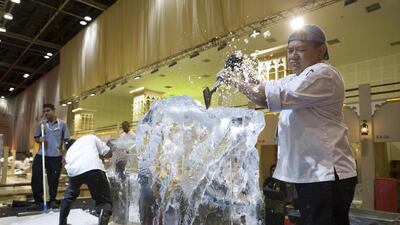DUBAI // Carefully crafted Halloween pumpkins and sculptures expertly chiselled from huge blocks of ice are among the highlights at the Dubai World Hospitality Championship this weekend.
The event, now in its second year, aims to show the finest in Emirati cuisine and hospitality, as well as bringing some of the best international chefs together in a contest to find the top cooks.
Among the other attractions are classic paintings and bronze statues from 19th-century European artists depicting Arab culture.
“I’ve tried some of the food and it’s fantastic,” said Jacqueline Perrottet, director at 19th Century Antiques.
She said she was impressed by the Emirati cuisine at the show, which is taking place at Dubai World Trade Centre and was attended on Friday by Sheikh Mohammed bin Rashid, Vice President, Prime Minister and Ruler of Dubai.
“I particularly like the sweets but, overall, the show is really interesting,” she said. “We specialise in 19th-century French antiques, which is pretty unique in Dubai.”
On show are a range of classic paintings and bronze statues depicting Arabian or Oriental styles.
The centrepiece is a Dh560,000 painting, Arabs Talking, painting by British artist Honore Boze.
“We also have a painting of an Oriental lady from Belgian painter Leon Herbo from around 1896 for Dh260,000,” Ms Perrottet said.
“My favourite piece is an antique bronze Othello statue for Dh480,000.”
On the sidelines of the event, Zabeel Palace Hospitality also launched the book Emirati Hospitality: Customs and Traditions.
It features the principles of Emirati hospitality, from Bedouin-style welcomes, desert-influenced drinks, cooking instruments, wedding clothes and other Emirati customs.
Ibrahim Ayoub, a sous chef at the Levantine restaurant at Atlantis the Palm, said the standard had improved from last year.
“People have worked on their weak points from last year and are much better prepared,” he said.
Mr Ayoub cooked a variety of Emirati and Lebanese dishes for the competition.
“Emirati food has much more spices than other Arabic food, so I’ve been making fish majboos, balaleat and chicken magouga,” he said.
“Emirati cooking is also very traditional so, for example, with the chicken magouga, they typically use dough to mix in rather than bread, and that is the way I’ve been cooking my dishes for the competition.”
The event features arts and crafts from all the emirates as well as local cooking contests, with chefs preparing food in front of an audience.
Norbert Girnth, a German master chef who is with the Emirates Culinary Guild and is among the judges for the ice-sculpting contest, said the standard had improved.
Contestants are given 90 minutes to saw, cut and chisel a solid block of ice into a sculpture.
“They have to stick to an Arabic theme but we give them artistic licence to create what they want,” he said. “They are not allowed to use power tools, everything must be done by hand.”
He said judges were looking to make sure that there was not a lot of wasted ice, how suitable it would be for a buffet and overall difficulty of the design.
The Dubai World Hospitality Championship concludes on Saturday.
nhanif@thenational.ae

